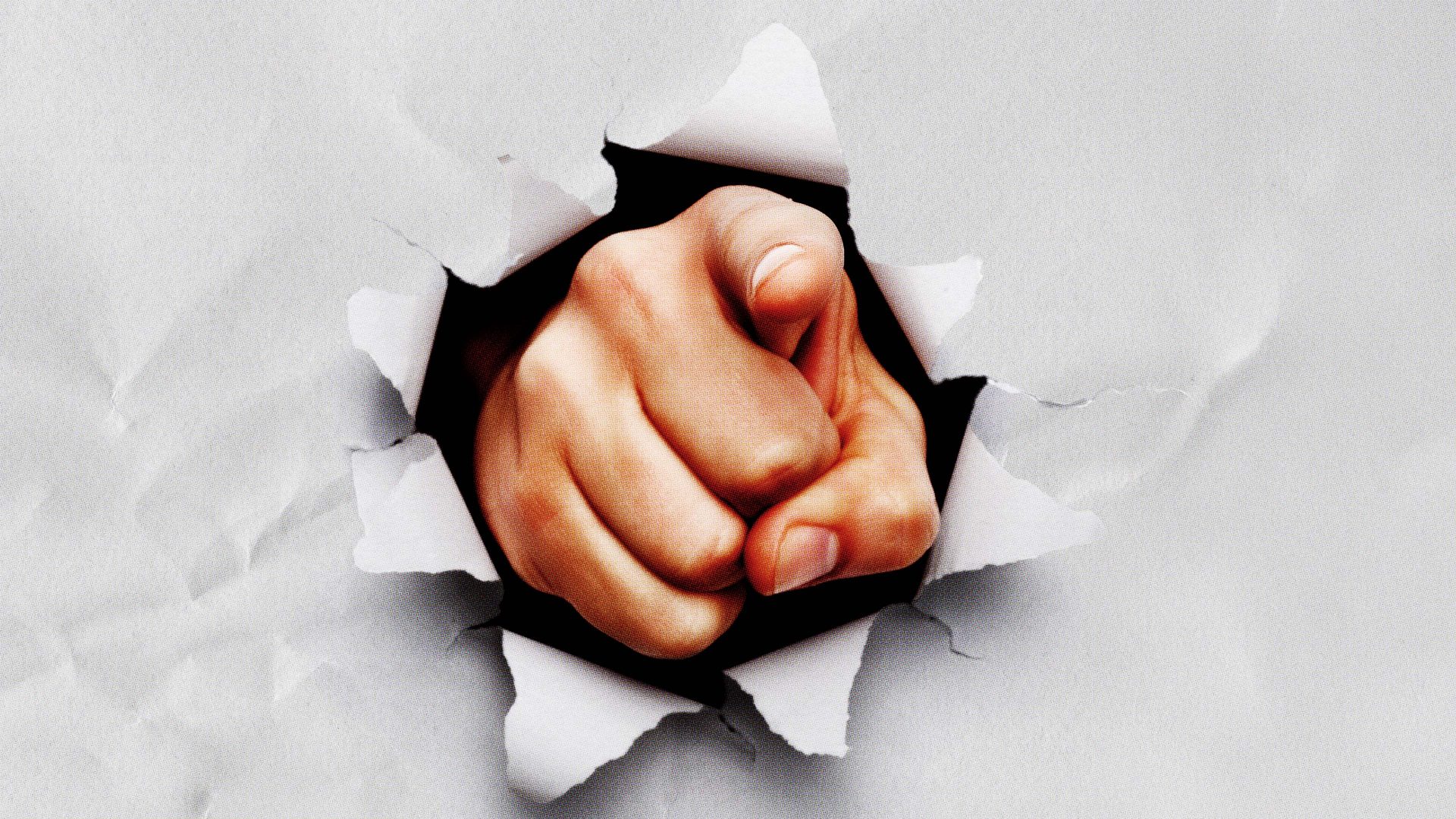Mark Zuckerberg is a powerful man. He’s the founder and CEO of Meta, the company which owns Facebook, Instagram, Threads and WhatsApp. It has more than three billion users in almost every country on the planet. No one controls more of the world’s communications than he does. But in 2025, Zuckerberg has made it very clear he’s what his new friends on the US right would call a “beta” male. Now Donald Trump has won the election, he’s making it very obvious that he’s fallen in line – Meta is working by a new rulebook now, and it’s one tailor-made to please Team Trump.
Fact-checkers are out (as is Nick Clegg). It’s OK to call gay people mentally ill on Facebook now. Moderators are moving to Texas. Zuckerberg is sorry that he “over-censored” users. The way Zuckerberg has gone about the changes is almost as significant as the changes themselves: Conservative influencers got a heads-up, Fox News got an exclusive interview, Zuckerberg appeared on the Joe Rogan Experience and then at the weekend headed to Mar-a-Lago.
At a stroke, Mark Zuckerberg has pivoted the social networks he controls into the Trump camp. He says the changes are the result of “the recent elections”, but Trump only won the US election: the rest of the world is still, for now, governed independently of America.
Mark Zuckerberg has just positioned himself and his companies directly in the middle of what is shaping up to be the biggest soft power conflict across the globe since the cold war. He has raised the stakes in Meta’s battles with regulators across the world – and he’s counting on dragging Trump into the conflict. The winner could reshape the future of the internet, and everyone who uses it.
Much of the coverage of Zuckerberg’s sweeping reforms focused on his decision to abolish the use of independent fact-checkers – for now in the US only, but it could roll out globally in time – on Meta’s services. This is a significant move, as these independent newsrooms fact-checked viral claims, such as those about Covid, on the network, limiting the spread of often dangerous false claims about Ivermectin, methylated spirits, and other supposed home cures.
But despite the fact it will result in journalists losing their jobs, the loss of fact-checking was far from the most significant change Zuckerberg announced. Instead, the real force of the changes was to be found in the actual changes to the global rules that will be enforced across Facebook, Instagram and more.
Political content will no longer be punished by the algorithm, and it is set to be allowed to be a much rougher place than it was: the new rules explicitly allow users to say that gay or trans people are mentally ill. They allow for transgender people to be referred to (against their will) as “it”. “Tranny” is no longer regarded as hateful speech.
The new rules make it permissible to say that one race is more intelligent than another, provided the claim makes reference to something backing up the claim: “Studies show” or similar covers the bases there. As another example memorably stated, nationalities can be likened to anatomy – “Italians are dickheads” is now allowed, as is “Mexican immigrants are trash” (though without the word “immigrants” would still be banned).
For those people who spend their time picking fights on the internet, or who like trolling others, these rule changes will undoubtedly be welcome. But for those who use Facebook or Instagram to try to keep up with people they know in real life, or who generally want to unwind browsing the internet before bed, their utility is far less clear.
The utility of Zuckerberg’s rule changes to users is questionable at best: these changes were not tested, there was no wide consultation, they are not being trialled or phased in. They are simply the new reality – and it is easier to see ways they could stop users spending time on Meta’s services than it is to imagine them attracting people to stay online longer.
Similarly, advertisers are generally cautious about what kind of content their brand appears alongside. Elon Musk has more than once launched into furious attacks on former Twitter/X advertisers for withdrawing their spending from his site – seeing it as a form of cowardice or even (bizarrely) censorship.
In reality, it is simply brand protection: most household brands don’t want their logo next to a range of racially charged insults about immigrants, or next to a dehumanising conversation about whether homosexuality is a mental illness. Meta makes more than $100bn a year from advertisers across the world, though, and clearly feels able to take this for granted.
Mark Zuckerberg’s rule changes are a huge professional gamble, then – they could cost Meta billions and they could create huge opportunities for social media sites to challenge his dominance.
Perhaps he felt that this was the safer bet, versus standing up to Donald Trump, who might use the power of the White House to act against Meta and its interests. Maybe he’s convinced that he can save billions in spending with looser moderation rules and less fact-checking.
But one underappreciated possibility is that Mark Zuckerberg’s own politics have changed. In 2016, Zuckerberg was still trying to win back trust after the Cambridge Analytica scandal, and sought political credit in the US for standing up to Donald Trump. After the Jan 6 riots in 2021, Trump was finally banned from Facebook and Zuckerberg tried to do a listening tour among liberals – trying to win back their admiration or support.
Instead, the Democratic Party and American liberals more broadly made it clear that Mark Zuckerberg would never be respected or admired, or even welcome among them. At the same time, they failed to do anything to actually reduce Zuckerberg’s power.
For all the much-vaunted talk of action against big tech, neither Biden nor his FTC chair Lina Khan created any meaningful new checks on tech power. And while Republicans in Congress hauled tech execs in front of them for their supposed “censorship of right wing voices”, Democrats were neither effective attack dogs nor useful defenders of tech.
There are two ways to keep a billionaire onside: you can play up to his ego and put him on a pedestal, or you can make yourself worthy of respect by obviously wielding enough power so that he knows he can’t ignore you. America’s liberals did neither – and so they helped pave the way for tech’s rightward trend.
Mark Zuckerberg got into UFC, he started threatening to fight Elon Musk, he buddied up with Republicans, and started referring to himself as a “classical liberal”. All of these were warning signs of his ideological shift, and all of them were largely missed, until now.
Zuckerberg may not just be aligning Meta with Trump for convenience: he may now be a true believer. This would make more sense, as he has likely created colossal headaches for his company, right across the world.
For all his talk about a new public mood, Zuckerberg is clearly overly focused on the USA. Elsewhere, the mood has been shifting towards a reckoning with tech. Australia is banning social media for under-16s, a move also being considered in Canada.
Brazil and India have cracked down on some content – the former having a very public fight with Elon Musk, which the world’s richest man lost. The UK’s Online Safety Act is in effect and raises the requirements on Meta to protect children using its services – only for Zuckerberg to sharply take the site in the opposite direction.
All of that is before we consider the EU, which loves to talk a tough game on American tech, even if it chooses its battles terribly and rarely turns draconian-sounding legislation into actual results. But the EU would like to get a grip on tech, and Meta might just galvanise it into doing things better.
Sadly, governments around the world will likely be called to act before too long. Parents around the world – including in the USA – have long been concerned about the effects of social media on their children. Mark Zuckerberg has just handed every teenage bully a handbook of ways to harass their victims without breaking his rules.
Teens are both clever and cruel, and will respond in kind. Social media is undoubtedly more dangerous for vulnerable young people as a result of Zuckerberg’s changes. Legislators around the world will be called to respond, as will regulators – and in the US, Zuckerberg should prepare himself for a new wave of lawsuits.
Zuckerberg is betting the company – or at least its reputation and profitability for the next five to 10 years – on dragging Donald Trump into this fight. Meta is a global company: when a government tries to regulate how it operates in their country, they are concerned with their own citizens and their own rules – and their own norms on free speech, privacy, and the like.
Meta is hoping to claim that countries trying to enforce their own sovereignty in this way is an attack on America, a form of “censorship”, or some kind of trade war. He has openly asked Donald Trump to intervene in these regulatory efforts. If Trump does so, that would be the most blatant attempt by the US to impose its own rules on its allies this century.
Mark Zuckerberg has fired the starting pistol on a new era of the culture war. It is no longer just a phrase. It will soon involve governments clashing over who gets to decide the rules of the internet – and whether the US can be allowed to declare cyberspace as American territory.
That’s clearly a battle Zuckerberg has decided he wants, as he has dragged Meta into the heart of it. That’s a hell of a gamble to take, especially as Donald Trump is mercurial at best. If Zuckerberg has gambled wrong, he may have thrown away the best days of his company, his legacy, and even some share of his ungodly wealth.
Mark Zuckerberg, at least, got to choose to be a combatant in the newly escalated culture war. The vulnerable children on Facebook and Instagram, though, did not. Zuckerberg has turned the culture war into a shooting conflict. He doesn’t seem to care that he’s put three billion of his users squarely in the crossfire.




